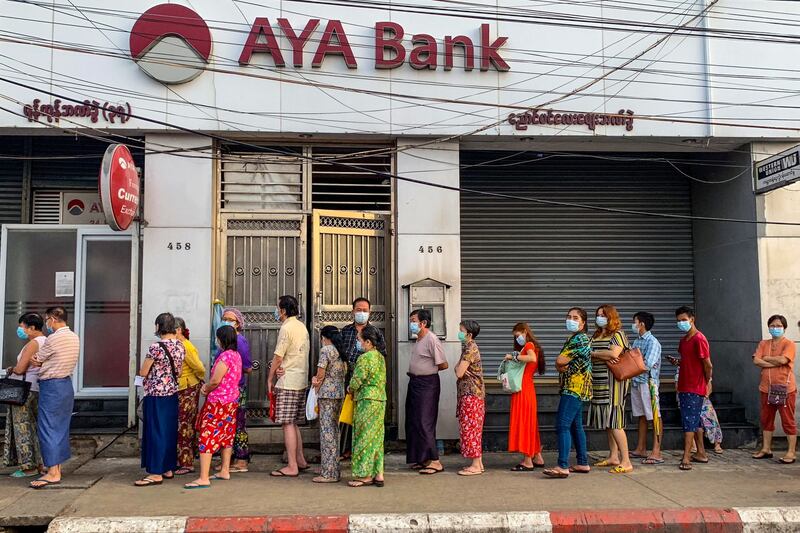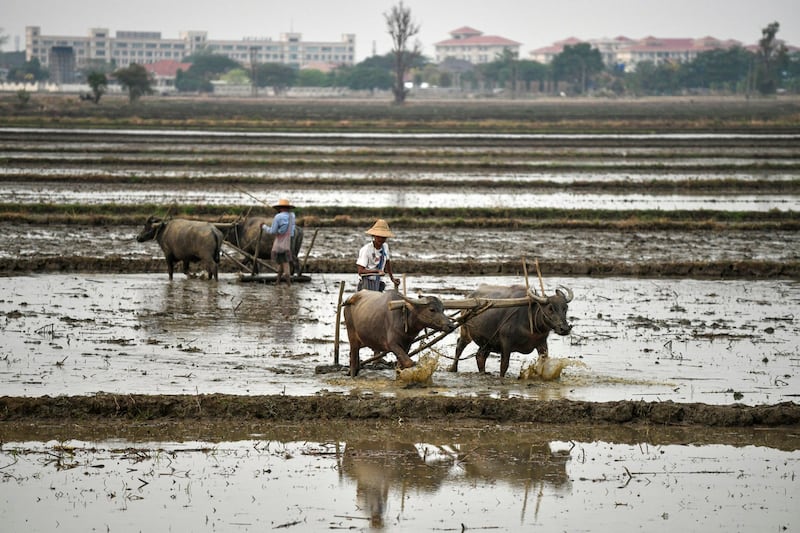As Myanmar grapples with a deepening economic crisis, the military junta has launched a sweeping crackdown on the rice market, arresting vendors and shopkeepers in an attempt to rein in escalating food prices.
Authorities have in recent days detained 11 rice vendors, including a Japanese national. The arrests, announced by the junta’s Ministry of Information, targeted seven large-scale rice vendors and four shopkeepers, some associated with popular chains like City Mart and Aeon Orange.
Those arrested face charges of non-cooperation with ministry orders, and possibly up to three years in prison and fines up to 500,000 kyat (US$154).
But the crackdown on the market for the vital staple extends beyond these arrests. Thirty shopping centers and stores have been charged with selling rice above mandated prices, while nearly 60 people have been questioned. The heavy-handed approach has even reached high-level officials and rice mill owners, who face questioning about the rising market prices.
Myanmar’s economy has been on the ropes since a February 2021 coup triggered political and economic upheaval after a decade of tentative reforms.
The World Bank said in a recent report that Myanmar's economy faced significant challenges and would remain "feeble" as conflict, macroeconomic instability and dislocation constrained production. In the six months to March, goods exports fell by 13% and imports fell by 20% compared with the same period a year earlier, it said.

A senior Central Bank of Myanmar official, who declined to be identified, recently pointed to such imbalances to explain the sliding kyat, which has plunged from about 1,350 to the dollar before the coup to about 4,500 to the dollar now.
The junta’s chief, however, has blamed the economic woes on fraudsters and manipulators. He ordered crackdowns on gold traders, after their prices rose sharply as the kyat fell, and on property agents blamed for capital flight as members of the dwindling middle class bought flats in neighboring Thailand as a bolt hole.
Now rice traders are getting the blame for surging prices that would appear to be largely out of their control.
The U.N. Development Programme, or UNDP, said in a recent report that rice prices rose by 45% in 2022 alone, attributed to higher inflation, a weakening kyat currency, and rising fuel and transportation costs.
‘Affordable rice’
Zaw Yan, a member of a farmers’ group called the Farmer Honorary Network, said input costs had surged, with diesel and fertilizer prices now up to five times higher than they were not so long ago.
Farmers now invest roughly one million kyat per acre for rice, a considerable sum that forces them to sell at higher prices just to break even, he told Radio Free Asia.
“These main costs and capital, none of the farmers, especially poor farmers, the lower class, can’t afford it. They don’t have it,” Zaw Yan said.
Compounding the problem, many agricultural communities have been affected by the departure of young workers to cities and abroad in search of work, while fighting between the junta and rebels, for the first time in some central rice-growing areas, has disrupted production.

The UNDP said in the key rice-producing regions of Sagaing and Magway, where household income has decreased by at least 36%, farmers also cited problems ranging from extreme weather to landmines.
In response to the rising prices of the staple, the Myanmar Rice Federation has hastily implemented an “affordable rice scheme” across 58 shops in 18 townships of Yangon, 120 in Mandalay and 96 shops in Naypyitaw regions, setting limits on retail prices and purchases and offering small loans to farmers. The federation did not respond to RFA’s enquiries about whether subsidies would be provided to shopkeepers.
The scheme was launched on June 25, according to the Ministry of Information.
“This scheme is to stop reselling rice at exorbitantly high prices. The federation requested individuals to cooperate in this to stop price manipulation,” the Ministry of Information said, encouraging customers to report vendors who sell rice at prices higher than the “5% band” established by the junta.
“The federation will arrange for social and religious institutions, government organizations, factories and restaurants to buy the rice at an affordable rate and at a reasonable portion,” it continued, adding that there was a two-bag limit per household per month.
RELATED STORIES
[ Myanmar junta bans all men from working abroadOpens in new window ]
[ Myanmar’s economy is still in free fallOpens in new window ]
[ One-third of Myanmar population in need of aid, says UNOpens in new window ]
The arrested vendors were accused of inflating prices well above those set under the ministry’s scheme.
The outlook for the market is far from certain with one vendor, who declined to be identified, saying that the junta’s warning had already been effective in scaring shopkeepers to keep prices low. Similarly, a good harvest season could also increase supply and bring prices down.
“Of course, the price of rice is going to fall,” said the vendor. “I estimate that the price could be 1.5 million kyat (US$ 462) per two acres in the coming harvest.”
Edited by Taejun Kang.
